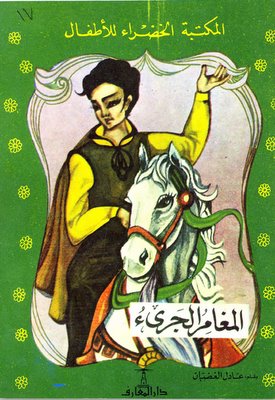 Out of all of Abdel Wahab’s prodigious output, this 1929 gem is my favourite, especially perfect during quiet afternoons staring out the window or sipping tea. It’s wafted through our house since childhood, one of my earliest memories of music appreciation. Part of Abdel Wahab’s forgotten early oeuvre before his modernist turn, Lama Enta Nawi T'ghib 'ala Tool treads the same ground as traditional Arabic songs of loss and heartbreak (and endlessly whining about that loss and heartbreak). The beloved departs without notice, leaving sadness, long hours full of loneliness, and rueful reflection in his wake. Somehow, however, Abdel Wahab renders this potential fest of unbearably maudlin sentiments into a light, airy, pleasing tune, helped along by an earnest male chorus. The lyrics combine forthright Egyptian ammiya (why didn’t you say so before leaving for so long?) with poetic images of the heartbroken companion left behind, seeing apparitions of his beloved: “I rise to embrace you but find only my illusions.” Like a lazy afternoon rag, Abdel Wahab’s voice induces a reflective mood, where fleeting apparitions mingle with the solid and mundane.
Out of all of Abdel Wahab’s prodigious output, this 1929 gem is my favourite, especially perfect during quiet afternoons staring out the window or sipping tea. It’s wafted through our house since childhood, one of my earliest memories of music appreciation. Part of Abdel Wahab’s forgotten early oeuvre before his modernist turn, Lama Enta Nawi T'ghib 'ala Tool treads the same ground as traditional Arabic songs of loss and heartbreak (and endlessly whining about that loss and heartbreak). The beloved departs without notice, leaving sadness, long hours full of loneliness, and rueful reflection in his wake. Somehow, however, Abdel Wahab renders this potential fest of unbearably maudlin sentiments into a light, airy, pleasing tune, helped along by an earnest male chorus. The lyrics combine forthright Egyptian ammiya (why didn’t you say so before leaving for so long?) with poetic images of the heartbroken companion left behind, seeing apparitions of his beloved: “I rise to embrace you but find only my illusions.” Like a lazy afternoon rag, Abdel Wahab’s voice induces a reflective mood, where fleeting apparitions mingle with the solid and mundane.

Wednesday, December 07, 2005
Afternoon Ghosts
 Out of all of Abdel Wahab’s prodigious output, this 1929 gem is my favourite, especially perfect during quiet afternoons staring out the window or sipping tea. It’s wafted through our house since childhood, one of my earliest memories of music appreciation. Part of Abdel Wahab’s forgotten early oeuvre before his modernist turn, Lama Enta Nawi T'ghib 'ala Tool treads the same ground as traditional Arabic songs of loss and heartbreak (and endlessly whining about that loss and heartbreak). The beloved departs without notice, leaving sadness, long hours full of loneliness, and rueful reflection in his wake. Somehow, however, Abdel Wahab renders this potential fest of unbearably maudlin sentiments into a light, airy, pleasing tune, helped along by an earnest male chorus. The lyrics combine forthright Egyptian ammiya (why didn’t you say so before leaving for so long?) with poetic images of the heartbroken companion left behind, seeing apparitions of his beloved: “I rise to embrace you but find only my illusions.” Like a lazy afternoon rag, Abdel Wahab’s voice induces a reflective mood, where fleeting apparitions mingle with the solid and mundane.
Out of all of Abdel Wahab’s prodigious output, this 1929 gem is my favourite, especially perfect during quiet afternoons staring out the window or sipping tea. It’s wafted through our house since childhood, one of my earliest memories of music appreciation. Part of Abdel Wahab’s forgotten early oeuvre before his modernist turn, Lama Enta Nawi T'ghib 'ala Tool treads the same ground as traditional Arabic songs of loss and heartbreak (and endlessly whining about that loss and heartbreak). The beloved departs without notice, leaving sadness, long hours full of loneliness, and rueful reflection in his wake. Somehow, however, Abdel Wahab renders this potential fest of unbearably maudlin sentiments into a light, airy, pleasing tune, helped along by an earnest male chorus. The lyrics combine forthright Egyptian ammiya (why didn’t you say so before leaving for so long?) with poetic images of the heartbroken companion left behind, seeing apparitions of his beloved: “I rise to embrace you but find only my illusions.” Like a lazy afternoon rag, Abdel Wahab’s voice induces a reflective mood, where fleeting apparitions mingle with the solid and mundane.
Wednesday, November 16, 2005
Childhood
 There are few relics of childhood more endearing to me than “Dhahaba al-Lailu,” the whimsical little ditty recounting poor Su-Su’s misadventures, my all-time favourite children’s song. This version is a lovely rendition in Muhammad Fawzi’s melodious voice, complete with the original instrumental overture and the call-and-response with the children’s chorus.
There are few relics of childhood more endearing to me than “Dhahaba al-Lailu,” the whimsical little ditty recounting poor Su-Su’s misadventures, my all-time favourite children’s song. This version is a lovely rendition in Muhammad Fawzi’s melodious voice, complete with the original instrumental overture and the call-and-response with the children’s chorus.Adults of a certain age will remember that the upstart Susu leaves school (sab madrastu), throws away his notebook (rama kurastu), and spends his time pulling the cat’s tail. Of course, he gets his hand scratched by the cat, and Muhammad Fawzi underlines the moral in case we’ve missed it: that’s what happens to someone who doesn’t heed every word that Mama utters. But alas, Susu’s mischief doesn’t end there. Fifi is upset with Susu so he tries to make up with her and gives her a kiss on the cheek, but she swears she won't kiss him back. Instead, she dips her fingers in ink and smears his face. Susu gets angry, hits her, and spills the ink all over her dress. Baba intervenes to end the mayhem and hits them both. The ditty ends on a more comforting note of children growing up and pursuing gainful employment in the professions.
I can’t really take “Dhahaba al-Lailu” seriously as a tool of social control, how could I with such a poetic opening: “Night is gone, dawn emerges, the bird chirps (saou saou!), and the cat meows (naou! naou!)” It’s one of the many works of art that graced my childhood, along with the fanciful tales of the Green Library (al-Maktaba al-Khadra). I notice only now the Platonic mission of the series. As its publishers write on the back cover, “These are stories treasured by every boy and girl…they enrich youngsters, uplift their souls, and guide them to the path of beauty and the good.”
For Karim Ramy Karam, a bold adventurer unhampered by parental social controls, as he treads his first steps on the path of beauty and the good.
Wednesday, November 02, 2005
Prelude
 In this new space, I share some of the music I love and can't live without, music that becalms and stimulates my waking hours, music that haunts my sleep. I couldn't do this without the amazing preservation and curatorial efforts of Samer Sawari; his turath project is a precious gift.
In this new space, I share some of the music I love and can't live without, music that becalms and stimulates my waking hours, music that haunts my sleep. I couldn't do this without the amazing preservation and curatorial efforts of Samer Sawari; his turath project is a precious gift.Each week or so, I'll feature a song I love. So let me begin at the beginning, with the patron saint of this and my other home: the phenomenal Shaykh Imam Eissa. Shaykh Imam died ten years ago this past June 7, but I paid him no proper tribute then. It's well past time for that tribute now. The Imam-Nigm duo are among the handful of my major sources of inspiration, the ones who never fail me. I can't imagine life without their sublime art, their irreverence, their addiction to truth-telling, and their sheer beauty. My understanding of Egyptian history bears their indelible imprint.
The song is "Ya Masr, 'oomi w'sheddi al-hayl," the spirit is irrepressible resistance, the 'ud is dolorous, Imam's voice is transporting, and there's dew on the roses. Aman, aman Bayram Effendi!
This maiden post is for the musical Zeryab and the inspiring Mohammed.
Subscribe to:
Comments (Atom)